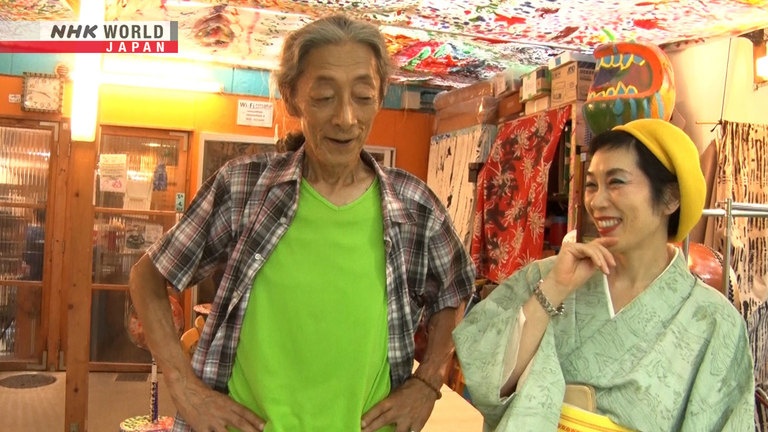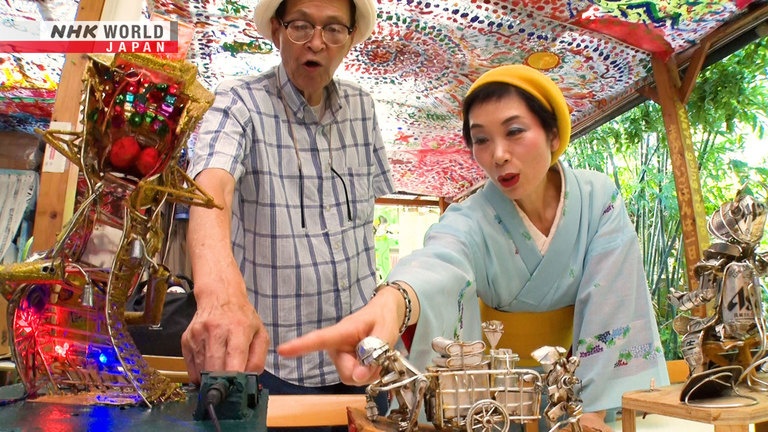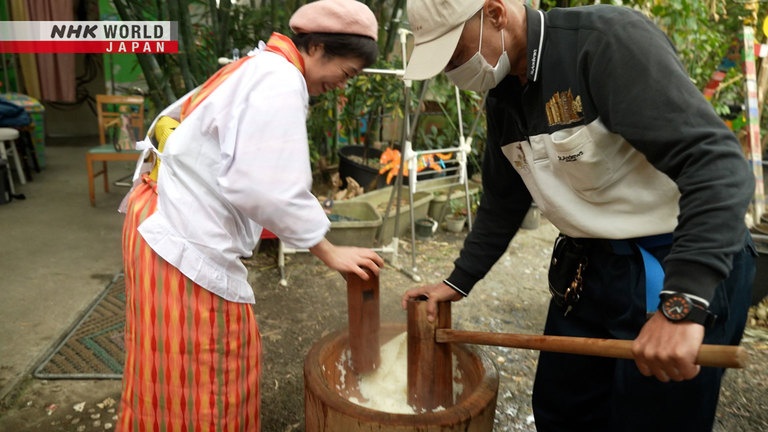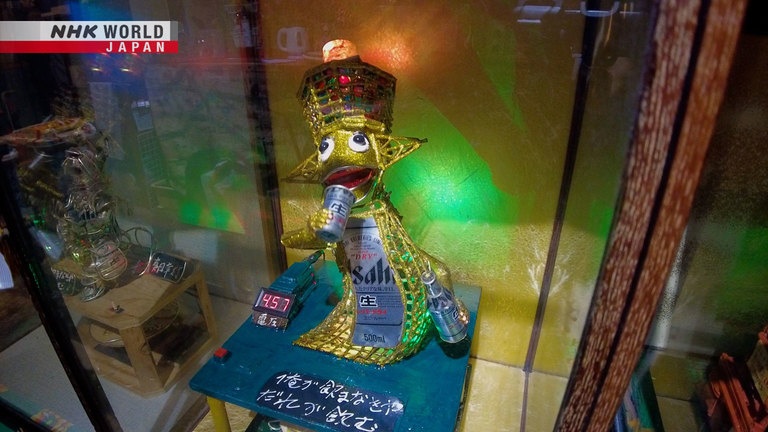Poet & NPO Founder - Ueda Kanayo
Meet Ueda Kanayo, an Osaka-based poet, activist and NPO founder helping disadvantaged former manual laborers to build community and discover themselves through the creative arts.




Transcript
FRONTRUNNERS
I was homeless, with nowhere to go, but eventually I found this place.
It gave me a fresh start on life.
The model is based on me when I'm drunk.
Life's about smiling through the tears. For all of us. Yes, joy and sorrow.
The arts can teach you a lot about life.
After all, life itself is just another form of self-expression.
Poet & NPO founder
Ueda Kanayo
Kamagasaki, in Osaka's Airin district,
has long been famed as one of Japan's main honeypots for casual laborers.
Each morning before dawn,
men gather in hope of finding work for the day.
Prospective employers display construction and laboring jobs
via placards in their car windows.
And a short discussion about terms is usually enough to seal the deal.
In the 1960s, Japan's rapid economic growth
saw a rush on construction and public works.
At its peak as a casual labor hub,
the Kamagasaki area had a population of around 30,000.
Of the 18,000 who live here now,
around 40% are elderly males who live alone.
Each morning, the local shopping arcade hosts a radio aerobics session.
Good morning! Please join in!
It's organized by store owner Ueda Kanayo.
She runs this cafe and guesthouse.
Opening for the day at 10 am,
one of the morning's first customers is this former laborer.
A beer please, darlin'.
We don't serve beer in the morning!
No beer until 12 o'clock!
Don't be so strict!
We're stricter than the local shelter!
This friendly banter is a big part of the cafe's appeal.
What have you been up to?
I had a bath, then the paper came at three.
Before that I did my laundry.
Laundry! Good job!
Another unique feature is the artworks adorning virtually every surface.
Like this curious automaton made from empty beer cans.
I like to display the creations of our local old timers,
things they made here.
The cafe and the guesthouse are really a front.
What we are is a place to build community and promote personal expression.
The base of my "Art NPO."
People define the arts differently, but to me, they're a way of life.
Ueda Kanayo's mother was a poet,
and from an early age that inspired a love of self-expression through verse.
Moving into the same career herself,
in 2001 she took part in this nationwide poetry contest.
Under a bridge,
in the shadow of the moon,
the insects gather.
In 2003, she opened her first cafe in central Osaka,
as a base for her creative endeavors.
She moved to Kamagasaki in 2008,
where she stays open 365 days a year.
The art initiatives she conducts here
are funded from cafe and guesthouse profits,
along with donations.
How are you today?
One regular throughout the last 15 years
has been 79-year-old Ando Nobushige.
What's this? A camera?
I'm a bit het up this morning.
Cheesed off.
That's the aisle, so let's sit you up here.
Easy does it.
If I was your age I'd be OK, but I can't turn back time.
Well, you've turned back death a few times!
Ando was still a teenager when he first came to Kamagasaki to find work.
In the early days of Ueda's cafe,
he'd shun art activities in favor of causing trouble.
Around 18 months in,
he finally took part in a creative writing workshop,
but Ueda was shocked when he asked for help with his Japanese.
I'd never even considered that Ando-san might struggle with writing.
But I really do think that
knowing I would step in to stop others making fun of him about that
was something that helped me to earn his trust.
Of course, it's important to express yourself,
but for that to be possible,
first you need to create a safe space where everyone feels able to do that.
That's the most important thing.
Like opening a floodgate,
from that point on the words and pictures flowed out of Ando.
And that was the inspiration for Ueda
to transform her business into a space for creative expression.
That's a good one!
Each August, Kamagasaki hosts a traditional summer festival.
Every year we lose somebody.
Every year, the festival includes a tribute to friends who passed away
in the last 12 months.
And every year that list includes locals
who had no-one to care for them in their final days.
Due to family strife and so on,
a lot of us simply can't go back to our hometowns.
I've lost two friends this year.
I can't visit their graves, so this is where I can pay my respects.
This year alone, the memorial list includes over 200 names.
Back at Ueda's cafe, another longstanding regular drops by.
What seems to be the problem?
This one stopped working properly.
But it seems fine now you're here!
Tominaga Takeshi specializes in moving "karakuri" ornaments.
A former construction machine operator,
he came to Kamagasaki after losing his job ten years ago.
Then, one day he brought one of his creations along to Ueda's cafe.
I made this miniature replica of the Tsutenkaku Tower,
and everybody praised it.
That felt good, so I guess I just took that and ran with it.
And I'm glad you did!
Everyone was amazed,
and that spurred you on to try all sorts of other things.
But everything starts with a drink, doesn't it?
Well, beer's my drink, and my source material.
They're all made of empty cans, you see.
Finding Ueda's cafe provided the spark for Tominaga
to try his hand at all sorts of new creations.
This piece depicts a husband and wife duo
hauling a cart loaded with household items up a steep hill.
On the wife's back is a baby holding a red pinwheel.
The figures are connected with fishing line to a rotating disc underneath,
which drives their movement.
This character is inspired by famous Osaka landmark, the Tsutenkaku Tower.
Constantly smiling through tears while drinking, alone.
The model is based on me when I'm drunk.
Life's about smiling through the tears.
For all of us. Yes, joy and sorrow.
Tominaga Takeshi lives alone in this humble apartment.
Here's another one. Flip the switch and it lights up.
He works whenever the muse takes him,
without making any blueprints first.
Today, he's transformed another empty beer can
into an arm for his latest piece.
His workspace is decorated with pictures of family.
These are my wife and son. Both dead now.
When did you start drinking heavily?
When my wife died, I guess.
She turned to alcohol after our son died.
He hanged himself... In his 20s.
This history underpins Tominaga's creative choices.
I only make happy faces.
I spend my time at home crying so it'd be no good to take that outside too.
That'd mean constant tears.
Shibuya, Tokyo.
With Ueda's help, Tominaga Takeshi has landed an exhibition
at a stylish uptown gallery.
The young art fans in attendance are enthralled by his creations.
There's a real humor to them.
The urge to make people happy really comes across.
I feel like if you ever had any worries and you went to him,
he'd dispel your anxieties and tell you not to stress so much.
Back in Kamagasaki...
Hey there!
A crowd gathers at Ueda's cafe.
They're here for an initiative she calls "Kamagasaki University of the Arts."
The classes are open to everyone,
even those with no money to pay for participation.
Ueda launched the scheme in 2012,
inspired by aging former laborers no longer able to work.
It's terrible when you have nothing to do day after day.
The only way to forget your demons is to drink.
One old guy told me that the key to stopping wasn't medical treatment,
but having something to live for.
So I realized that if they had something else to look forward to,
they may be able to quit.
Today's activity is a collaborative haiku writing session.
Write whatever comes to mind. One line on the right.
Someone else will finish the poem for you.
In groups of three, they tackle the usually solitary task of haiku writing.
Deep in thought over his own contribution
is this 68-year-old regular known only as Keijiro.
He's lived in Kamagasaki for the last eight years.
That's my line done.
Bellies stuffed full. A bamboo-covered island. Many mosquitoes.
It sounded like both man and mosquitoes must be feeling nice and full!
Keijiro, too, saw his life transformed by praise for his creative efforts.
That's what sucked me in.
I got complements, so I kept on coming.
That's right. You were so grumpy before that!
I just didn't want to know.
I remember it.
He always looked so wary and stern.
I never thought I'd get to just be myself like this.
I guess not.
Above the cafe is Ueda's guest house.
And every morning,
Keijiro comes to help out with the cleaning as a volunteer.
I used to run my own company, but it went broke.
Everything was auctioned off, and my mom died, too.
I was married with three kids.
But I ended up on the streets, with nowhere to go.
Eventually I wound up here.
I just didn't want to see anybody.
I almost felt like going off to die quietly in the hills of Shikoku.
I never dreamed I'd find myself cleaning up for other people.
But it's fun.
And ultimately, it's really for myself.
Ueda Kanayo also lives locally with her own family.
Thirteen-year-old Kokomi has been raised in Kamagasaki
since she was a baby,
and many former laborers treat her almost like their very own daughter.
Let's tuck in!
Yum!
All the old guys would ask how she was
or wonder why she wasn't there that day.
And if she went outside just for a moment,
she'd come back in clutching 500 yen or some snacks.
Score!
Like, why would an old homeless guy give her 500 yen.
But that's how it was.
And how does Kokomi see her mother?
She's a very unique thinker... I guess.
And she can make conversation with anyone.
Ueda is on her way to visit a familiar local face.
Hi there.
Cafe regular, Ando Nobushige.
In and out of the hospital since the summer,
following another downturn,
he's currently unable even to swallow solid food.
Ueda brings a card to cheer him up.
He passed away one week later.
With no family to mourn for Ando,
Ueda and her customers gather to give him a fitting send off.
'Til next time, Ando-chan.
Ueda composes a special poem for the occasion.
You left home, learned, worked, ailed.
Lost loved ones, and gained loved ones.
Over and over,
hither and thither.
Sometimes falling, only to stand again.
And find new words.
Thank you.
I've known many people who opened up at the very end of their lives
to leave us an important message.
It made me realize how people can keep on evolving right to the end.
Late September, 2023.
And Ueda Kanayo is working on a new initiative.
Her destination is a shelter in the Airin district
for those with nowhere else to go.
It currently provides beds for 130 people.
And though it started out as an emergency accommodation,
some users have been here for years.
Ueda hopes that the expressive potential of art
can give some of these people the boost they need
to get back on their feet.
Though I've been based around here for 20 years,
this'll be the first time I've hosted activities in an actual shelter.
She's joined by a group of students
from the social art coordination course at Osaka Metropolitan University.
Some might feel uneasy to see a bunch of unfamiliar faces roll in.
But I do hope some will take part.
It's a big task.
But the best we can do is create a safe space to put people at ease.
The first day of the initiative arrives.
Woah, that's too much.
Don't forget to measure!
We figured that offering snacks might encourage participation.
They decide to bake some cakes for attendees.
These look great!
The plan is to host four sessions over the next two months,
with philosophy and calligraphy classes taught by experts.
And to avoid scaring potential participants away,
they decide there'll be no cameras allowed.
How will they get on?
Two hours later...
Thanks so much. See you next time.
They were a lot chattier than I expected.
What a relief.
We got 14 people in this time.
Two months later, and the sessions have been a big hit with residents,
who channeled all sorts of ideas into their calligraphy.
At first, they all looked so tense,
and nobody wanted to open their mouths.
Just sitting there like they were trying to disappear.
At first, anyway.
But by the end we couldn't stop them all talking, chatting away all smiles.
And I think making time for them to do that
was a chance for them to rediscover a kind of human warmth.
One participant was 51-year-old Kitamura Toshio,
who arrived in Kamagasaki after losing his job as an agency worker.
He's been in the shelter for five years.
What sort of things did he write?
"If you give up, the game is over."
"Adversity equals opportunity." I guess these are messages to himself.
I feel like Kitamura-san had put a lot of thought
into what he was going to write today.
It has given me a little bit more confidence.
I've never really had many chances to speak in front of people.
"If you give up, the game is over"
is something I've been telling myself lately.
Late December, and Ueda's cafe hosts its annual rice-cake pounding session.
And they receive an unexpected visitor.
Shelter resident, Kitamura Toshio.
- Kitamura-san, do you do this often?
- It's my first time.
Your first time?! Really?!
The first thing I need to do is find a job.
Then the next step will be to get out of the shelter.
What is it that motivates Ueda Kanayo in her art-based social initiatives?
Creative expression is a chance to reassess the world around you,
and discover a new you.
And by creating a safe space for people to do that,
I hope we can give those who have been excluded or hemmed in by the world
a chance to get out there and change society for themselves.